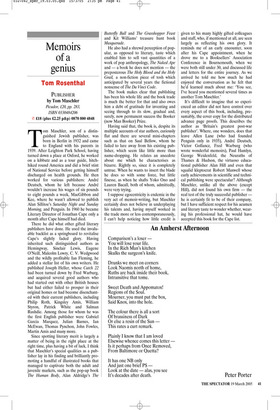Memoirs of a genius
Tom Rosenthal
PUBLISHER by Tom Maschler Picador, £20, pp. 283, ISBN 0330484206 ✆ £18 (plus £2.25 p&p) 0870 800 4848 Tom Maschler, son of a distinguished Jewish publisher, was born in Berlin in 1932 and came to England with his parents in 1939. After Leighton Park School, having turned down a place at Oxford, he worked on a kibbutz and as a tour guide, hitchhiked round America and did a brief stint of National Service before getting himself discharged on health grounds. He then worked for various publishers: André Deutsch, whom he left because André wouldn’t increase his wages of six pounds to eight pounds a week, MacGibbon and Kee, where he wasn’t allowed to publish Alan Sillitoe’s Saturday Night and Sunday Morning, and Penguin. In 1960 he became Literary Director of Jonathan Cape only a month after Cape himself had died.
There he did what other gifted literary publishers have done. He used the invaluable backlist as a springboard to revitalise Cape’s slightly faded glory. Having inherited such distinguished authors as Hemingway, Sinclair Lewis, Eugene O’Neill, Malcolm Lowry, C. V. Wedgwood and the wildly profitable Ian Fleming, he added a stellar list of his own writers. He published Joseph Heller, whose Catch 22 had been turned down by Fred Warburg, and acquired several good authors who had started out with other British houses but had either failed to prosper in their original homes or had become disenchanted with their current publishers, including Philip Roth, Kingsley Amis, William Styron, Patrick White and Salman Rushdie. Among those for whom he was the first English publisher were Gabriel Garcia Marquez, Julian Barnes, Ian McEwan, Thomas Pynchon, John Fowles, Martin Amis and many more.
Since spotting literary merit is largely a matter of being in the right place at the right time, plus having a bit of luck, I think that Maschler’s special qualities as a publisher lay in his finding and brilliantly promoting a handful of illustrated books that managed to captivate both the adult and juvenile markets, such as the pop-up book The Human Body, Alan Aldridge’s The Butterfly Ball and The Grasshopper Feast and Kit Williams’ treasure hunt book Masquerade.
He also had a shrewd perception of popular, as opposed to literary, taste which enabled him to sell vast quantities of a work of pop anthropology, The Naked Ape and — a book he does not mention — the preposterous The Holy Blood and the Holy Grail, a non-fiction piece of tosh which anticipated by several years the fictional nonsense of The Da Vinci Code.
The book makes clear that publishing has been his whole life and the book trade is much the better for that and also owes him a debt of gratitude for inventing and seeing through to its slow, gradual and, surely, now permanent success the Booker (now Man Booker) Prize.
Having said that, the book is, despite its multiple accounts of star authors, curiously flat and there are several mini-chapters such as that on Saul Bellow, whom he failed to lure away from his existing publisher, which seem like little more than name-dropping. He relates an anecdote about me which he characterises as bizarre. Rightly so, since it is completely untrue. When he wants to insert the blade he does so with some force, but little finesse, as when he shafts Yoko Ono and Lauren Bacall, both of whom, admittedly, were very trying.
I suppose egocentricity is endemic in the very act of memoir-writing, but Maschler certainly does not believe in underplaying his talents and, having myself worked in the trade more or less contemporaneously, I can’t help noticing how little credit is given to his many highly gifted colleagues and staff, who, if mentioned at all, are seen largely as reflecting his own glory. It reminds me of an early encounter, soon after his Cape appointment, when he drove me to a Booksellers’ Association Conference in Bournemouth, when we were both still under 30, and discussed life and letters for the entire journey. As we arrived he told me how much he had enjoyed the conversation as he felt that he’d learned much about me: ‘You see, I’ve heard you mentioned several times as another Tom Maschler.’ It’s difficult to imagine that so experienced an editor did not have control over every aspect of this book, including, presumably, the cover copy for the distributed advance page proofs. This describes the author as ‘Britain’s greatest post-war publisher’. Where, one wonders, does that leave Allen Lane (who had founded Penguin only in 1935), André Deutsch, Victor Gollancz, Fred Warburg (who wrote wonderful memoirs), Paul Hamlyn, George Weidenfeld, the Neuraths of Thames & Hudson, the virtuoso educational publisher Alan Hill and even that squalid kleptocrat Robert Maxwell whose early achievements in scientific and technical publishing were spectacular? Although Maschler, unlike all the above (except Hill), did not found his own firm — the real test of the truly successful publisher he is certainly fit to be of their company, but I have sufficient respect for his acumen and literary taste to wonder whether, wearing his professional hat, he would have accepted this book for the Cape list.
















































 Previous page
Previous page